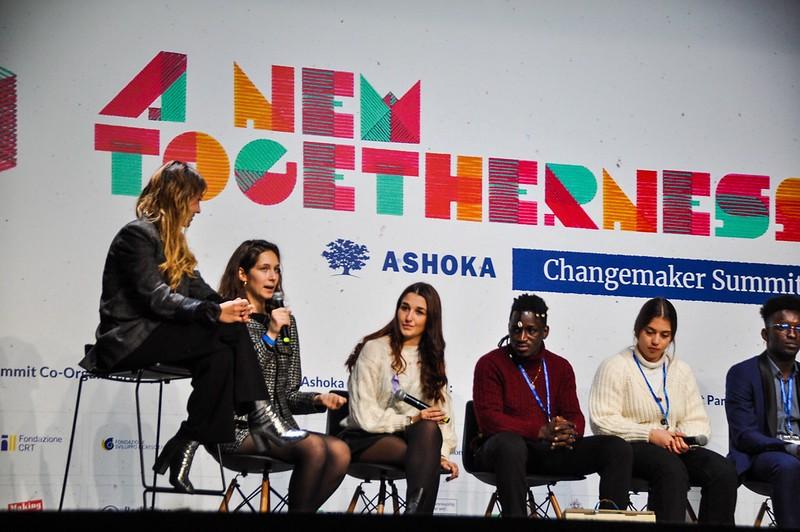
What does it take to build a world where each and every person has the confidence and support to create positive change?
This vision might seem lofty, but it’s grounded in the daily work of changemakers who are taking action to transform the way our world works, from health care, to technology, to how we grow food. And over the past three months, we’ve heard from many of these global voices as we embarked on a collective learning journey at the Ashoka Changemaker Summit to discover a “new togetherness.”
We learned about community-based movements and changemakers who are working together to redefine our systems, putting power in the hands of the people and inspiring others to take the lead on issues that matter to them. Here are a few things we’ve learned about reclaiming agency to make “Everyone a Changemaker” a reality.
Shifting the power to young people
To solve the complex problems in our society, traditional career paths aren’t going to cut it. Instead of asking young people “what do you want to be when you grow up,” what if we asked “what problem are you going to solve?” We hear from Midria Pereira, who is building a more inclusive community at the University of São Paulo through spoken word poetry, on why children need opportunities to be changemakers.
Start with personal experience
Alejandro Daly’s work to measure and combat xenophobia is rooted in his organization’s identity as an organization of young migrants claiming their rightful seat at the table. They are confronting discrimination through powerful combination of advocacy and technology. He explains how this young group has mobilized 100,000 people:
How one girl can create a ripple effect
Aditi has seen first-hand the power of a mindset shift. She connects young girls in rural Indian communities with mentors who can support them to realize their power. Once one girl sees herself as powerful and discovers new possibilities for her future, the impact spreads to everyone around her.
Shifting the power in health
Neo Hutiri saw that people were having to wait far too long to access their chronic medication, and found a way to solve this problem via technology. He sees the innovation as part of a movement: empowering people to take charge of their own health, and communities to provide the support that traditional facilities can’t.
Shifting the power in food production
The root of inequality, says Luis Fernando Guedes, is land. When smallholder farmers and indigenous communities play a leading role in food production, the power shifts. With new policies and more community-owned solutions, we can begin to make change on a larger scale.
Shifting the power in tech
Big Tech often assumes that data holds all the answers we need. But collecting data about social problems is not the same thing as solving the problems. Inequalities are built into our technologies. To challenge power dynamics, we must muster the political will to take action and fix the systems, says Ashoka Fellow Gemma Galdon, founder of Eticas Consulting:
Shifting the power in entertainment
We have a long path ahead to make every industry more inclusive. Looking within the world of entertainment, Miki Woodard, Head of Good Robot at Bad Robot Productions, shines a spotlight on the storytellers: From the script to the set, who is on the crew? Who is in the writer’s room? And do they feel the safety to bring their full selves and creativity to that space?
Changing the story around aging
Changemakers are challenging the West’s tragic narrative around aging to show that aging is a natural and complex process. Anne Basting, founder of TimeSlips, is empowering elders to create and share stories with the world.
Shifting our values — because shifting power isn’t enough.
Without analyzing the powers at play in a system, we’ll misdiagnose the problem, says Tarek Zeidan, Executive Director of Helem, the leading LGBTQ rights organization in the Arab world. But we can’t fix the system simply by giving more power to those who have less of it. A system is more than a tug-of-war between different groups — there are many factors that often go unchallenged. To make real systems change, we must also focus on the difficult work of shifting values.
And an important reminder: Power imbalances have created trauma. You can’t ask someone who is oppressed to lead the way without also providing the resources and support to do it.
Living values in the workplace
Companies are operating in an ecosystem that’s shaped by white dominant society. Challenging this oppressive context to create more inclusive companies is an uphill battle — for BIPOC leaders, too, says Yvonne. Our values must stay at the forefront, informing every policy and practice — from how companies do their investments to vacation and leave for employees.
Empathy is a necessity, not an option
Shifting values takes time, and it’s impossible without empathy. Tarek reminds us that we must step into the experiences and perspectives of others in order do the deep, and often gradual, work of transformation.
- - -
About the Ashoka Changemaker Summit
The Changemaker Summit “A New Togetherness” is Ashoka’s yearly global gathering. It connects a vast community of social innovators and leaders from business and philanthropy to celebrate inspiring solutions, learn, and collaborate towards systemic change. Tune in every Thursday through December for conversations on Planet and Climate, Equity, and more. On December 2, we hosted the culminating event in Turin, Italy. More information at https://acms.ashoka.org/